- Home
- Edmund White
City Boy Page 6
City Boy Read online
Page 6
I would go to the Stonewall and drink three or four vodka tonics to get up the nerve to ask John Stipanela, a high school principal, to dance. I had a huge crush on him but he wasn’t interested in bedding me, though we did become friends. One night there I picked up an ultra-WASP boy working in his family business of import-export, but I found him a bit too passive—until I discovered he was the guy my office-mate at work was obsessively in love with and had been mooning over for months. I felt bad about cock-blocking my office-mate (“bird-dogging,” as we said then) and sort of impressed with myself that I’d scored where he, a much better looking man, had failed.
Then there was the raid, the whimper heard round the world, the fall of our gay Bastille. On June 28, 1969, the bar was raided, and for the first time gays resisted. The Bureau of Alcohol, Tobacco, and Firearms staged the raid, since they’d discovered the liquor bottles in the bar were bootlegged and that the local police precinct was in cahoots with the Mafia owners. As the patrons and workers were being led out of the bar and pushed into a paddy wagon, the angry crowd that had gathered outside began to boo. Then some of the queens inside the van began to fight back—and a few escaped. The crowd was energized by the violence.
Everyone was so pissed off over that particular police raid because once the World’s Fair was over, the cops seemed to forget about us and lots of new bars had opened. There were raids, but only once a month and usually early in the evening, so as not to spoil the later, serious hours of cruising and dancing and flirting and drinking. Now we had a new, handsome mayor, John Lindsay. But he only looked better. He was in constant conflict with the unions, with antiwar protesters, with student radicals who took over Columbia—and with the gay community.
Before the Stonewall uprising there hadn’t really been much of a gay community, just guys cruising Greenwich Avenue and Christopher Street. But when the police raided Stonewall and gay men feared their bars were going to be closed once again, all hell broke loose. I was there, just by chance, and I remember thinking it would be the first funny revolution. We were calling ourselves the Pink Panthers and doubling back behind the cops and coming out behind them on Gay Street and Christopher Street and kicking in a chorus line. We were shouting “Gay is good” in imitation of the slogan “Black is beautiful.”
Up till that moment we had all thought that homosexuality was a medical term. Suddenly we saw that we could be a minority group—with rights, a culture, an agenda. June 28, 1969, was a big date in gay history.
GLBT leaders like to criticize young gays for not taking the movement seriously, but don’t listen to them. Just remember that at Stonewall we were defending our right to have fun, to meet each other, and to have sex.
A Black Maria had carted off half the staff and a few kicking, writhing drag queens, while the rest of the policemen waited inside with the others. I’d been walking past with a friend and now joined in, though resistance to authority made me nervous. I thought we shouldn’t create a fuss. This was bad for our image. I said out loud, “Oh, come on, guys.”
Yet even I got excited when the crowd started battering down the barricaded door with a ripped-up parking meter and when someone tossed lit garbage into the bar. No matter that we were defending a Mafia club. The Stonewall was a symbol, just as the leveling of the Bastille had been. No matter that only six prisoners had been in the Bastille and one of those was Sade, who clearly deserved being locked up. No one chooses the right symbolic occasion; one takes what’s available.
Two weeks later I wrote a letter about the event to Alfred and Ann Corn, a young married couple I’d only recently met and who were away for the summer on the West Coast. I obviously had no idea how serious the uprising was or would prove to be, how it would usher in a whole new era of gay consciousness. It would turn out to be as epoch-making as the 1934 Nazi raid on and destruction of Magnus Hirschfeld’s Institute for Sexual Science in Berlin, which ended the first gay liberation movement in history. In the late 1980s I concluded a novel, The Beautiful Room Is Empty, with a lengthy description of the event.
Chapter 7
About this time I met Richard Howard, the poet, critic, and translator. A guy I’d been dating named Frank had started chatting with Richard at a West Village gay bar. Frank told Richard that he had a friend (me) who’d written a “brilliant” novel no one would buy. (In truth, Frank hadn’t read it.) Richard scrawled out his phone number on a trick card provided by the bar and kept close to the entrance and told Frank to have me call him.
As Frank said, “I think he’s the only established writer who goes to the bars.” Certainly no one I knew had ever met a real writer, though strangely enough one of the first things Richard said to me was “When we were young, the older writers were all very remote and regal, but now we are completely available to the young.”
I called Mr. Howard and he laughed a bit insultingly (or was it just nervously?) and said in a brisk, possibly peremptory tone, “Stand on the corner of Thirteenth Street and Eighth Avenue exactly at two o’clock today and I’ll come hurrying past on the way to my shrink and effect a manuscript-lift.”
A bit stunned, I repeated the details just to make sure I’d—but Mr. Howard interrupted me and laughed and said, “Yes, that’s what I just said.” And he hung up.
At the appointed time I was standing on the corner (half a block from my new apartment) with the manuscript in hand. I was wearing sawed-off blue-jean shorts and a maroon T-shirt. My hair was freshly washed and combed, but I wished I’d slept better and didn’t have such dark circles under my eyes. Suddenly I saw him whirling up the street at a fast clip in a cape, his bald head gleaming. He sized me up with a head-to-toe survey and a cocked eyebrow. I had no idea what sort of impression I made. I had already been going to the gym for three years by that point, long before most other gay men, and my body was certainly revealed by my tight clothes.
“Have you included your phone number on your manuscript?”
“Yes,” I said. “It’s on the top page.”
“Now I have lots of things on my desk at the moment to clear up, but I can assure you I’ll have some sort of word for you about your work at the weekend.” Then he was off. A bit stupefied, I watched him rush uptown, my manuscript in his hand.
My novel was called Forgetting Elena and became my first published book, thanks to Richard (the only blurb on the back was written by Richard as well). It was (and is) mysterious, experimental, original. I’d become so frustrated writing plays and novels I thought would please other people that I’d finally decided to write something I would want to read. I thought, if I’m always going to be rejected, I might as well like my hated “child.” It was obvious, by perusing Forgetting Elena (which at that point was called Something Valentine), that I’d been reading Kafka and Beckett, though it wasn’t a pastiche of either of those great writers. I was fascinated by court ritual and had immersed myself in books by and about courtiers in Heian Japan—The Tale of Genji and The Pillow Book of Sei Shonagon in particular. I’d read and reread Ivan Morris’s World of the Shining Prince, about Genji. I was also fascinated by Versailles under Louis XIV, and I loved W. H. Lewis’s book about it, The Splendid Century.
My book, however, wasn’t a historical novel. I’d written several chapters of it while vacationing on Fire Island in the Pines. The rituals of gay men there—the afternoon swimsuit “tea dances” at the Botel next to the harbor, late dinners together at a cottage (the whole house propped up by stilts on the dunes) that a group of six or eight had rented together, the men’s return to the harbor at midnight for more stoned dancing till dawn—rhymed in my imagination with the rituals of medieval Japan or Versailles. In Japan sudden, sometimes brutal sexual encounters in the dark would erupt, just as on Fire Island the communal living would be punctuated by quick, thrilling fucks in the dunes at the “Meat Rack.” After the disco finally closed shop at dawn, beautiful, sweaty men would stagger off into the scrub brush between communities to have group sex. At Versailles no titles were
used in conversation, though everyone was conscious of exact gradations in rank; in the same way on Fire Island penniless beauties and millionaire lawyers all laughed and made love together, all dressed in the same swim trunks or jeans and sandals. With no cars on Fire Island, everyone was reduced to hauling home his groceries in a kid’s red metal wagon over the raised, bumpy boardwalks.
As if this blend of court ritual and Fire Island communal living weren’t hard enough to grasp, I’d decided to have my first-person narrator be an amnesiac who’s afraid to admit he has no idea who he or anyone else is. Since he remembers nothing, the whole book is told in the present tense. The narrator is constantly building up and revising suppositions about what’s going on around him and where he fits in. I thought this was what we were all doing all the time: modeling our behavior on the expectations of those around us and the cues we were being fed. The self was a social self; at our core lay a reciprocity. Admittedly I was an extreme example of this adaptability. I was inspired by Erving Goffman’s idea that the self is defined through reciprocal role-playing—that life is theater.
Richard met with me a week later. He’d gone over the entire manuscript and corrected many errors in taste and diction. I had inserted footnotes here and there, which he thought (correctly, I’m now convinced) drew too much attention to the text as a text and added an unattractively coy note. It provided the reader with an escape route out of the labyrinth of the book. Richard argued that the whole book couldn’t be called Something Valentine since, in fact, the narrator is wrong—he’s not one of the Valentines. Richard said the book was too short. I needed to add another long chapter of thirty or so pages, since a novel shorter than two hundred pages was impossible to sell.
I worked on the book for several months. My heart sank at the prospect of adding new pages since I’d composed the novel by instinct alone. It was as if I had tuned my dials to a certain frequency; once my mind started emitting the right hum, I knew I could proceed. I was convinced I’d written a wonderful book—but I wasn’t exactly sure how I’d done it. Richard didn’t overpraise me but in a businesslike way let me know that he thought it was worth rescuing. His practical manner gave me the courage to revise.
Once I’d finished the revisions he did no more than glance at them. I gave the revised, much longer novel to my agent, who submitted it to Robert Gottlieb, who was then head of Knopf. He took months and months considering it (which, I was later told, was quite uncharacteristic of him). Finally he rejected it, though at one point he’d seemed on the verge of buying it. He wrote, “I like high-class junk and junky junk—but this book isn’t junky at all.” I was confused. By that time I was living in Rome. I remember walking back from the American Express office beside the Spanish Steps, where I received my mail, and thinking that I wanted to commit suicide. I sobbed and said aloud to myself as I walked along, “I can’t speak! They won’t let me speak!” I sat down on a bench looking out over the ruins of the forum and thought that if God didn’t send me a sign, I’d just kill myself. At that point a handsome blond Roman came up and asked me if I was all right. I decided to live at least long enough to have sex with him—he was obviously an angel.
Maybe my book was bad, I conceded, or too weird, but hundreds and hundreds of bad books were published every year. Anyway, it wasn’t bad. It was good. I felt that all I’d ever wanted was to be a published writer. Now I was thirty and nothing was working out. I felt humiliated. Gottlieb went on to edit the New Yorker and to write with lyricism and insight about Balanchine. In the late 1980s, in Paris, I was introduced to him several times, and mutual friends told me I was all wrong about him, he was a great defender of the arts, poor man—he’d suffered for his exquisite taste. Now that I’ve become someone to whom other people submit manuscripts, I know there must be at least a dozen young writers out there who detest me for not helping them enough. One of them has started savaging my books in print. He wrote, “Edmund White is the fattest, ugliest writer in America, rivaled only by Harold Bloom.” He asserted that all my books were failures, including my biography of Jean Genet—a subject, he said, I’d spoiled for a whole generation.
Richard Howard, back then when I first met him in 1969, suggested my book be sent to Anne Freedgood at Random House, even though that publisher had already rejected it once (as had twenty-some other publishers). Richard called Anne and told her she must accept it. She did, but only after waiting many more months. I’d finished and revised Forgetting Elena by 1969 after three years’ work; it was published in 1973—seven years from start to finish for a book of two hundred pages. When I was back in New York, and Mrs. Freedgood and I had lunch to discuss revisions (more revisions!), it suddenly dawned on me that my agent had submitted the old manuscript to her, not the one I’d rewritten under Richard Howard’s direction. I asked to look at it; yes, it was the old dog-eared text. I realized the agent had been sending out the wrong version all along.
Anne liked the revised text when she finally received it a few days later, but she still insisted that the book couldn’t end so vaguely. I, who’d been so impressed by the abstract expressionist painters at Cranbrook, had wanted to create a verbal equivalent to those nonrepresentational paintings. Or rather, I knew that language (unlike strokes of paint) was symbolic and that nonsense syllables or strings of meaningless words à la Gertrude Stein would be tiresome to read. The trick, I thought, would be to write real sentences and to seem to be heading somewhere but to have the action keep canceling itself out—something I soon realized John Ashbery was doing in poetry. But Anne Freedgood said that in my novel I was entering into a contract with the reader; I was promising a mystery and I must deliver the payoff at the end. In the end, the book was widely reviewed as a mystery. How frustrating for true devotees of the genre!
But I’m getting ahead of my story. Before I went to Rome and before the book was accepted, Richard and I had become inseparable. He was always affected and pedantic and arrogant, but somehow these qualities, so tiresome in other people, were delightful and refreshing in him. He generated a kind of constant brio, as if he possessed many motors and they were all fed by the highest-octane fuel. Every moment with him had a sense of occasion. I felt that I was leading my usual backwater life when suddenly a pleasure boat would roar into view, its decks brilliant with guests in evening clothes. Except there was no way not to notice Richard. Richard wasn’t putting on the prevailing upper-class manner or the American version of a donnish style; he was inventing a whole new way of talking and moving and laughing. He spoke in a high, nasal voice with an elegant stutter, yet he was groping not for words but for rhetorical effect—for emphasis, surprise. He didn’t have an English accent, nor the “mid-Atlantic” one so popular in New York in those days, but rather something that seemed to correspond to his idea of how Henry James might have talked—with elaborate grammar, odd word choices, sudden boutades, and an eerie emphasis on ordinary, everydayish words. He had a stylized way of throwing his head back, of holding a hand frozen in the air like Jupiter hurling a thunderbolt. He could cock an eye to devastating effect and raise an eyebrow in lofty disdain. His laugh was warm and encouraging, but theatrically so. Then once in a great while he’d have a little, humble smile, as if he’d caught himself being such a camp.
He was a great source of information on the eccentricities of his friends and acquaintances (he had a well-stocked memory, and if it ever failed him, he would strike his forehead lightly with his fist, as if to startle the mechanism back into functioning). But whereas Henry James wanted to be a gentleman and worried about any irregularities in the lives of those around him, Richard gloried in the strange, both in himself and others. He wore a red cape and many of his clothes were flashy or funny. It wasn’t that he was unaware of the effect he was making—he just wanted to be making one.
Richard could be harshly impatient if one “failed” him in some way—if one hadn’t read George Meredith’s Diana of the Crossways or if one said one didn’t “get” Gerard Manley Hopkins. He w
ould roll his eyes, looking for help, possibly divine intervention. He’d whisper, “Oh, darling, how can you say such a thing?” For him the pantheon of great artists and writers and composers included almost everyone I’d ever heard of, past or present. No friend was allowed to have blind spots or preferences (though later he wrote a book of poems called Preferences). He was finishing in those days Alone with America, his thousand-page tribute to forty-one living American poets; I’d heard of only five or six of them (though later I came, through Richard’s good offices, to read and even meet many of them). He admired his forty-one “immortals” extravagantly, but he could treat them with a strangely sadistic edge. I remember when he introduced the bibulous Alan Dugan at the venerable YMHA (where T. S. Eliot and Dylan Thomas had read). Dugan has largely been forgotten, but he had won the Yale Younger Poets award and later the Pulitzer and the National Book Award for slim volumes austerely named Poems I, Poems II, Poems III, and so on. Richard said, “Alan Dugan is a souse, in the original sense of the word as ‘salt,’ ‘source,’ ‘spring.’” For several years Richard had been a lexicographer, and these bizarre, sometimes shaming verbal associations would crop up in his writing and conversation.

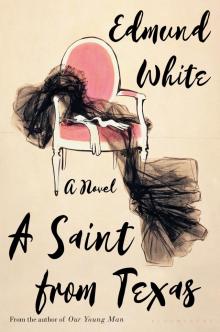 A Saint from Texas
A Saint from Texas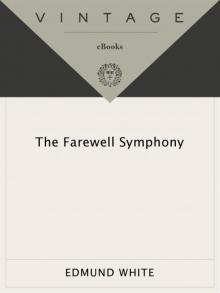 The Farewell Symphony
The Farewell Symphony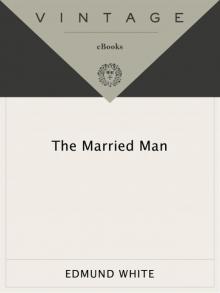 The Married Man
The Married Man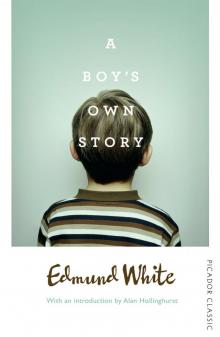 A Boy's Own Story
A Boy's Own Story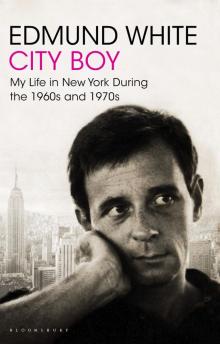 City Boy
City Boy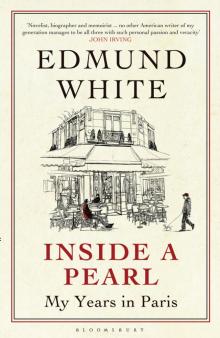 Inside a Pearl
Inside a Pearl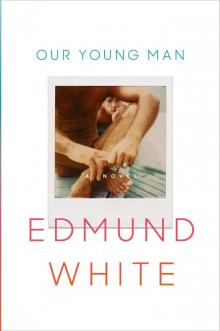 Our Young Man
Our Young Man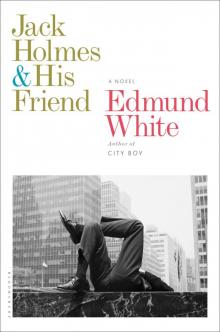 Jack Holmes and His Friend
Jack Holmes and His Friend